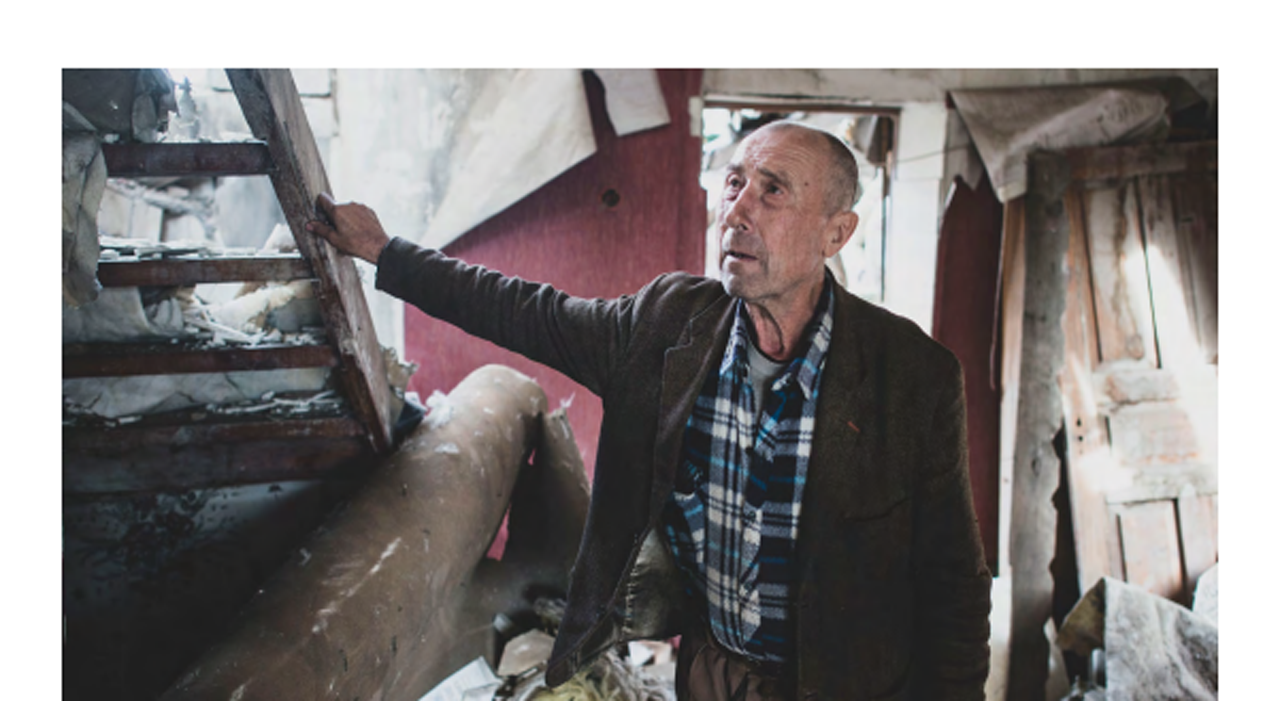3 March 2022 – After weeks of heightened tensions and escalating conflict in eastern Ukraine, on 24 February the Russian Federation began a full-scale military intervention across the country. The armed violence escalated in at least eight oblasts (regions), as well as in eastern oblasts Donetska and Luhanska which were already affected by the conflict. The intense military escalation has resulted in loss of life, injuries and mass movement of civilian population throughout the country and to neighboring countries.
Credit: OCHA/Yevhen Maloletka. An older man showing the house he had built for his children that was largely destroyed due to active hostilities.
Significant damage to infrastructure has left hundreds of thousands of people without electricity and water, while bridges and roads damaged by shelling have left communities cut off from markets for food and other basic supplies. The most pressing humanitarian needs are for emergency medical care, essential medicines, health supplies and equipment, safe water for drinking and hygiene items, and shelter and protection for people displaced from their homes. Women, children, the elderly, people with disabilities, people living near the line of contact and those living in non-state-controlled areas are currently most in need of assistance.
The Health Cluster has undertaken the development of the Public Health Situation Analysis (PHSA) estimating 18 million affected, with 6 million targeted for humanitarian healthcare and a financial request of $US 89 million. Local and international partners are committed to respond to the ongoing humanitarian crisis by addressing the following priorities: 1) guarantee the treatment of the wounded/trauma affected and other in critical need; 2) provide lifesaving sexual and reproductive health care (including antenatal care); 3) contain the COVID-19 pandemic; 4) sustain routine immunization activities; 5) intensify mental health and psychosocial support; 6) facilitate the shipment and delivery of health kits; 6) strengthen health information and surveillance; 7) support the procurement and delivery of medicines, medical supplies and equipment, particularly to primary health care; 8) develop supply chain pipelines; 9) ensure functioning of health infrastructure; and, 10) ensure family friendly services that cater especially for mothers and children.
The immediate support in this initial phase includes regular updates on partner capacity and presence; establishing a humanitarian corridor; enhance the readiness and availability of mobile teams; restoring interrupted water, electricity and gas supply for health infrastructure; coordinating safe medical evacuation routes and destination; delivering kits, medicines, medical supplies, and trauma equipment; and finally, providing access to mental health and psychosocial support.
The Health Cluster response is part of the Humanitarian Flash Appeal and the Regional Refugee Response Plan for Ukraine that was launched by Secretary-General António Guterres on 1 March 2022.
More resources
Regional Refugee Response Plan 2022
Find the most recent updates from the Ukraine Health Cluster
Read the latest OCHA Humanitarian Impact Situation Report
Subscribe for the OCHA Situation Reports
Read the WHO situation reports on the Ukraine emergency
UN launch to appeal to fund humanitarian operations in Ukraine
Ukraine Refugee Situation (UNHCR)

